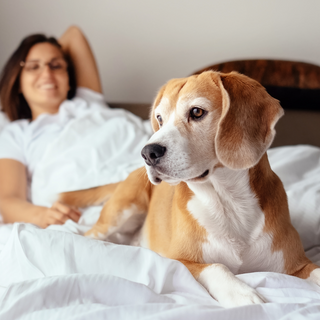Here's Why Your Dog Might Go ‘Barking Mad’
"Barking is completely normal communication," says Vet Nurse Rachel Garbutt. "But in late summer, with neighbourhoods busier and family routines changing, it can quickly tip into excess. The aim isn't to stop dogs from barking, but to ease the triggers that make life stressful for both pets and people."
1. Street Noise and Foot Traffic
"Back-to-school mornings mean a sudden rush of people – children heading to school, buses, bikes, and neighbours walking dogs," explains Vet Nurse Rachel. "For territorial dogs, this can be a lot to process at once. A simple change, like using blinds or putting on white noise during peak times, can really help. Once things are calmer, you can reintroduce window-watching slowly, using it as a training opportunity to reward calm behaviour." 2. Delivery Drivers and Doorbells
2. Delivery Drivers and Doorbells
"With the surge in summer shopping – from school supplies to garden furniture – doorbells can feel like constant alarms to dogs," says Rachel. "Many owners don't realise that the adrenaline from one barking episode can take 20 minutes or more to subside, so several deliveries in a day leave dogs feeling constantly on edge. Training a calm 'door routine' helps enormously – for example, calling your dog to a set spot away from the door and rewarding them there turns the whole moment into something predictable and positive."
3. Other Dogs Barking Nearby
"In busy neighbourhoods, one bark can easily lead to another – what we call 'cascade barking," notes Vet Nurse Rachel. "With open windows and lighter evenings, dogs hear each other more clearly. Closing windows during peak times or playing gentle background music helps reduce the impact, and specially designed canine playlists can be surprisingly effective. It's about lowering the overall stimulation, so your dog doesn't feel the need to join in every barking chorus."
4. Changes in Routine and Alone Time
"After a summer of constant company, dogs can suddenly find themselves home alone when the school term begins," explains Rachel. "That abrupt change can lead to stress or barking for attention. One of the best things you can do is practise shorter separations before longer ones are needed. Giving your dog an interactive treat or puzzle feeder as you leave helps create a positive link with alone time, so they're not just waiting by the door for you to return." 5. Overexcitement in the Garden
5. Overexcitement in the Garden
"Late-summer BBQs, garden games, and children playing outdoors can all be overwhelming for dogs," says Rachel. "The high-pitched noises and sudden movements can be particularly stimulating. That's why it's so important to provide a calm indoor retreat – somewhere with soft bedding, fresh water, and familiar toys. When dogs have the option to step away, they can regulate themselves and relax when the excitement feels too much.
Enrichment can also play a big role. Licky mats, snuffle mats, and puzzle toys are great ways to keep your dog's mind engaged, helping them stay occupied and less focused on the noise outside."
Written by Butternut Box https://butternutbox.com/ .
- Choosing a selection results in a full page refresh.


